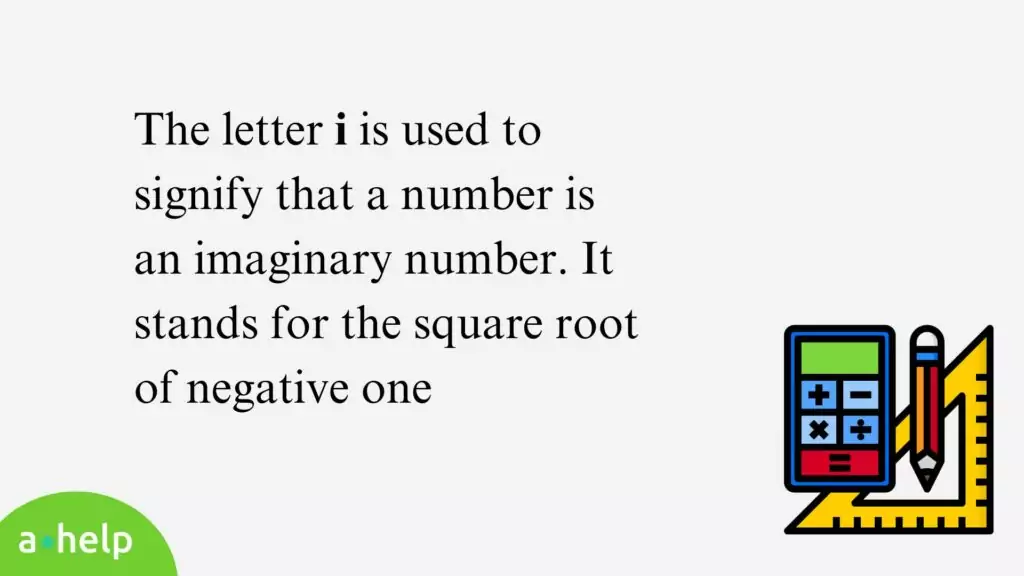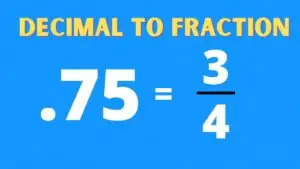Mathematics is replete with a variety of symbols that signify concepts, operators, constants, and variables. The letter ‘i’ is one of these symbols with a unique and remarkable role in this broad discipline. Let’s dive in to understand what ‘i’ stands for in math, particularly in relation to imaginary numbers and their applications in various fields, such as electrical engineering.

✅ AI Essay Writer ✅ AI Detector ✅ Plagchecker ✅ Paraphraser
✅ Summarizer ✅ Citation Generator
‘I’ as the Square Root of Negative One
In mathematics, the concept of ‘i’ originates from the challenge of finding the square root of negative numbers. The traditional numbers we deal with on a daily basis, also known as real numbers, do not offer a direct solution to this problem. This is where ‘i’ steps in.
‘i’ is defined as the square root of negative one:
- By convention, it is a symbol that represents an imaginary unit. When squared, ‘i’ equals negative one:
i^2 = -1. - The concept of ‘i’ helps mathematicians solve equations that involve the square roots of negative numbers.
- ‘i’ is also a fundamental component of complex numbers, which are numbers consisting of a real part and an imaginary part.

Imaginary Numbers and Complex Numbers: The Role of ‘I’
‘Imaginary numbers’ are numbers that can be written as a real number multiplied by the imaginary unit ‘i’. For example, 3i, -5i, and 7.1i are all imaginary numbers. On the other hand, complex numbers are numbers that contain both a real part and an imaginary part. They can be written in the form of a + bi, where ‘a’ and ‘b’ are real numbers.
‘I’ in Algebra and Mathematical Equations
In algebra, ‘i’ is used to solve polynomial equations that have no real solutions. With the introduction of ‘i’, such equations can have complex roots instead. This opens up an entirely new realm of possibilities and uses for algebra. In essence, ‘i’ extends the real number line to a complex plane, thereby enabling mathematicians to define and work with complex numbers.
Equations involving ‘i’ can be simplified using some basic properties of ‘i’. The most important of these properties are:
i^1 = ii^2 = -1i^3 = -ii^4 = 1
These rules recur every four powers of ‘i’. Using these properties, expressions involving ‘i’ can be simplified.
The Use of ‘I’ in Electrical Engineering
Interestingly, the use of ‘i’ and complex numbers is not confined to pure mathematics. They play a significant role in fields like electrical engineering. In electrical engineering, ‘j’ is used as a symbol for the imaginary unit due to a conflict with ‘i’ used for current. Complex numbers are used in electrical engineering to describe the behavior of electrical circuits, particularly those involving alternating current.
The History of ‘I’ and the Term ‘Imaginary Unit’
The term ‘imaginary unit’ was coined in the 17th century. At that time, mathematicians were skeptical of numbers that, when squared, produced negative results. Because these numbers seemed impossible or “imaginary,” the term ‘imaginary unit’ was created. Over time, the value of imaginary numbers and the significance of ‘i’ has been recognized in many fields beyond mathematics.
Conclusion
In conclusion, the letter ‘i’ in mathematics represents the imaginary unit, which is the square root of negative one. It facilitates the comprehension and solution of mathematical equations that wouldn’t have solutions in the set of real numbers. Furthermore, the applications of ‘i’ and complex numbers extend into various other scientific fields, such as electrical engineering, underscoring their practical importance. Understanding the concept of ‘i’ helps in expanding our mathematical horizon by offering new methods to address complex mathematical problems.
FAQ
What does ‘i’ stand for in complex numbers?
In complex numbers, ‘i’ represents the imaginary unit, which is the square root of negative one. It forms an essential part of complex numbers, which have both a real and an imaginary component.
How is ‘i’ used in algebra?
‘i’ is used in algebra to solve equations that do not have real solutions. By introducing ‘i’, these equations can have complex solutions, expanding the scope and utility of algebraic equations.
Can ‘i’ be raised to a power?
Yes, ‘i’ can be raised to any integer power. The result cycles every four powers, with i^1 = i, i^2 = -1, i^3 = -i, and i^4 = 1.
What is the square root of negative one?
The square root of negative one is defined as the imaginary unit, represented by the letter ‘i’ in mathematics.
Why is ‘i’ called an imaginary unit? What is the history of the term ‘imaginary unit’?
‘i’ is called an imaginary unit because it represents the square root of negative one, a concept that was initially thought to be impossible or “imaginary”. The term ‘imaginary unit’ emerged in the 17th century and has since become a cornerstone of complex number theory.
What are the properties of ‘i’ in mathematical equations? What is the significance of ‘i’ in math equations?
‘i’ possesses certain properties, like i^1 = i, i^2 = -1, i^3 = -i, and i^4 = 1, that recur every four powers. ‘i’ is significant in mathematical equations as it allows for the definition and manipulation of complex numbers and provides solutions to equations that would not otherwise have real solutions.
How to simplify expressions involving ‘i’?
Expressions involving ‘i’ can be simplified using its properties. Given that the powers of ‘i’ recur every four, any power of ‘i’ can be reduced to one of the four basic cases: i^1 = i, i^2 = -1, i^3 = -i, i^4 = 1.
Follow us on Reddit for more insights and updates.





Comments (0)
Welcome to A*Help comments!
We’re all about debate and discussion at A*Help.
We value the diverse opinions of users, so you may find points of view that you don’t agree with. And that’s cool. However, there are certain things we’re not OK with: attempts to manipulate our data in any way, for example, or the posting of discriminative, offensive, hateful, or disparaging material.